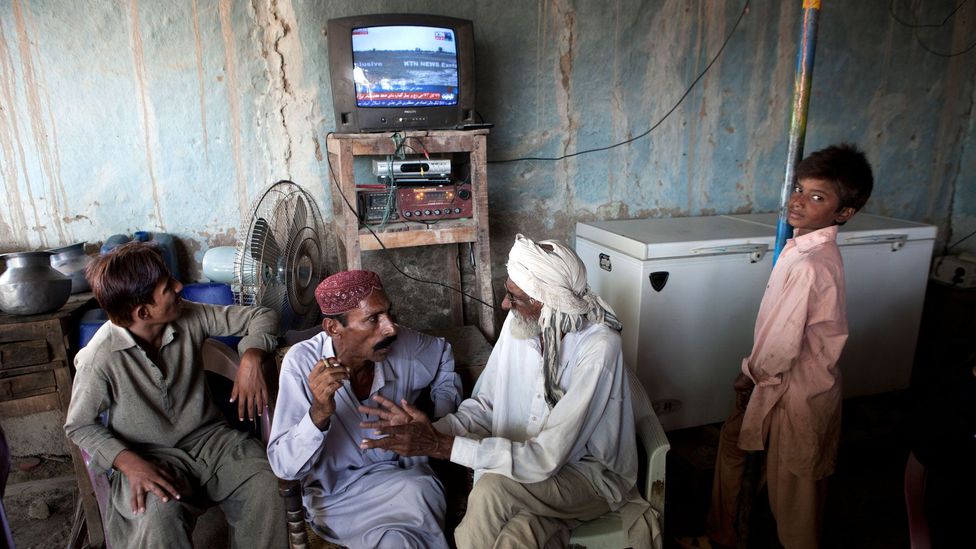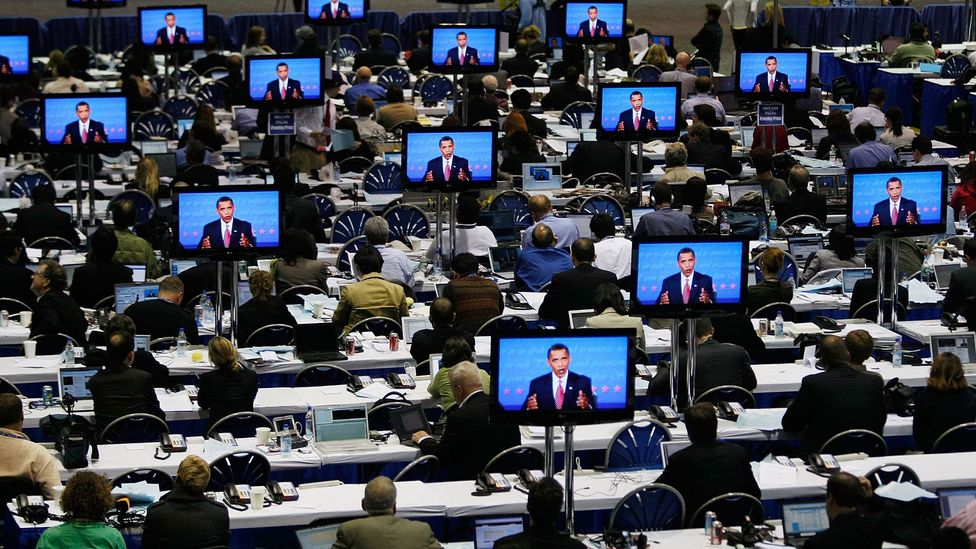
(Image credit: Getty Images)
The latest research suggests that the news can shape us in surprising ways – from our perception of risk to the content of our dreams to our chances of having a heart attack.
Alison Holman was working on a fairly ordinary study of mental health across the United States. Then tragedy struck.
On 15 April 2013, as hundreds of runners streaked past the finish line at the annual Boston Marathon, two bombs exploded, ten seconds apart. Three people were killed that day, including an eight-year-old boy. Hundreds were injured. Sixteen people lost limbs.
As the world mourned the tragedy, news organizations embarked upon months – years, if you count the trial – of graphic coverage. Footage of the moment of detonation, and the ensuing confusion and smoke, were broadcast repeatedly. Newspapers were strewn with haunting images: blood-spattered streets, grieving spectators, and visibly shaken victims whose clothing had been torn from their bodies.
And so it happened that Holman and colleagues from the University of California, Irvine, found themselves in the midst of a national crisis, sitting on data about the mental wellbeing of nearly 5,000 people just before it happened. They decided to find out if that had changed in the weeks afterward.
It’s intuitively obvious that being physically present for – or personally affected by – a terrorist incident is likely to be bad for your mental health. By chance, there were some people in the study who had the first-hand experience of the bombings, and it was indeed true that their mental health suffered. But there was also a twist.
Another group had been even more badly shaken: those who had not seen the explosion in person but had consumed six or more hours of news coverage per day in the week afterward. Bizarrely, knowing someone who had been injured or died, or having been in the vicinity as the bombs went off, were not as predictive of high acute stress.
“It was a big ‘aha’ moment for us,” says Holman. “I think people really strongly, deeply underestimate the impact the news can have.”
It turns out that news coverage is far more than a benign source of facts. From our attitudes to immigrants to the content of our dreams, it can sneak into our subconscious and meddle with our lives in surprising ways. It can lead us to miscalculate certain risks, shape our views of foreign countries, and possibly influence the health of entire economies. It can increase our risk of developing post-traumatic stress, anxiety, and depression. Now there’s emerging evidence that the emotional fallout of news coverage can even affect our physical health – increasing our chances of having a heart attack or developing health problems years later.
Crucially, just a few hours each day can have an impact far beyond what you might expect. Why?

The impact of the news is a psychological mystery, because most of it doesn’t actually affect us directly (Credit: Getty Images)
Ever since the first hints of a mysterious new virus began to emerge from China last year, televised news has seen record viewing figures, as millions diligently tune in for daily government briefings and updates on the latest fatalities, lockdown rules, and material for their own armchair analysis.
But in 2020 these sources aren’t the only or even the main, way that we keep up to date with current affairs. When you factor in podcasts, streaming services, radio, social media, and websites – which often want to send us notifications throughout the day – as well as links shared by friends, it becomes clear that we are constantly simmering in a soup of news, from the moment we wake up in the morning to the moment we close our eyes each night.
You might also like:
- How your looks shape your personality
- The medications that change who we are
- How your friends change your habits
Surprisingly few studies have looked into how this all adds up, but in 2018 – well before we were confined to our homes with a major global crisis unraveling around us – the average American spent around eleven hours every day looking at screens, where information about global events is hard to escape. Many of us even take our primary news-delivery devices, our mobile phones, to bed.
Hardwired affects
One potential reason the news affects us so much is the so-called “negativity bias”, a well-known psychological quirk that means we pay more attention to all the worst things happening around us.
It’s thought to have evolved to protect us from danger and helps to explain why a person’s flaws are often more noticeable than their assets, why losses weigh on us more heavily than gains, and why fear is more motivating than opportunity. Governments even build it into their policies – torn between providing a positive or negative incentive for the general public, the latter is much more likely to work.
The news is accidentally warping our perception of reality – and not necessarily for the better.
The bias may also be responsible for the fact that the news is rarely a light-hearted affair. When one website – the City Reporter, based in Russia – decided to report exclusively good news for a day in 2014, they lost two-thirds of their readership. As the science fiction writer Arthur C Clarke put it, the newspapers of Utopia would be terribly dull.
Could this extra dose of negativity be shaping our beliefs?
Scientists have known for decades that the general public tend to have a consistently bleak outlook, when it comes to their nation’s economic prospects. But in reality, this cannot be the case. The existence of “economic cycles” – fluctuations in the economy between growth and hardship – is one of the cornerstones of modern economics, backed up by decades of research and experience.

People tend to worry about how a crisis will make them feel in the future – and this can lead them to consume more news (Credit: Getty Images)
The view that the future is always worse is plainly wrong. It’s also potentially damaging. If people think they won’t have a job or any money in five years, they aren’t going to invest, and this is harmful for the economy. Taken to the extreme, our collective pessimism could become a self-fulfilling prophecy – and there’s some evidence that the news might be partly responsible.
For example, a 2003 study found that economic news was more often negative than positive – and that this coverage was a significant predictor of people’s expectations. This fits with other research, including a study in the Netherlands which found that reporting about the economy was often out of step with actual economic events – painting a starker picture than the reality. This consistent negativity led the perceptions of the general public away from what the actual markers of the health of the economy would suggest. More recently, the authors of one paper even went so far as to argue that media coverage amplifies periods of prolonged economic growth or contraction.
The news is accidentally warping our perception of reality – and not necessarily for the better. Another example is our perception of risk.
Take global tourism. As you might expect, people don’t usually fancy going on holiday where there is political instability, war or a high risk of terrorism. In some cases, the news is a source of direct advice on these matters – conveying government instructions to, say, come home amid a global pandemic. But even when there is no official line to stay away – or rational need to – it might be influencing us through subconscious biases and flaws in our thinking.

The news can shape our views about the safety of foreign countries (Credit: Getty Images)
One way this is thought to happen is through “framing effects”, in which the way something – such as a fact or choice – is presented affects the way you think about it. For example, a drug which is “95% effective” in treating a disease sounds more appealing than one which “fails 5% of the time”. The outcome is the same, but – as a pair of economists discovered in the 70s and 80s – we don’t always think rationally.
In one study, when scientists presented participants with news stories containing equivalent but differently phrased, statements about political instability or terrorist incidents, they were able to manipulate their perception of how risky that country seemed. For example, saying a terrorist attack was caused by “al-Qaeda and associated radical Islamic groups” was considerably more concerning than saying “Domestic rebel separatist group” – though both have the same meaning.
Sometimes, these subtle influences might have life or death consequences.
A 2014 study found that the public generally views cancers that are overrepresented in the news – such as brain cancer – as far more common than they really are, while those which aren’t often discussed – such as male reproductive cancers – are seen as occurring much less frequently than they do. People who consume the most news generally have the most skewed perceptions.
The research, conducted by the health communication expert Jakob Jensen from the University of Utah, along with scientists from across the United States, raises some alarming possibilities. Are people underestimating their own risk of certain cancers, and therefore missing the early warning signs? Previous studies have shown that a person’s ideas about their own risk can influence their behaviour, so the team suggests that this is one possible side-effect.
And that’s not all.
Intriguingly, the public perception of a cancer’s prevalence is closely mirrored by federal funding for research into its causes and treatment. Jensen and his colleagues suggest that news coverage might be shaping public perception, which, in turn, could be influencing the allocation of government resources. (Although it’s also possible that the public and the media are both reinforcing each other).

The news can lead us to miscalculate risks, such as the probability of developing certain cancers (Credit: Getty Images)
Finally, there’s growing evidence that the news might even infiltrate our dreams.
Amid the current global lockdowns, a large number of people – anecdotally, at least – are reporting dreams which are unusually vivid and frightening. One explanation is that these “pandemic dreams” are the result of our imaginations going wild, as millions of people are largely shut off from the outside world. Another is that we’re remembering our dreams better than we usually would, because we’re anxiously waking up in the middle of REM sleep, the phase in which they occur.
But they could also be down to the way the outbreak is being portrayed by the news. Research has shown that the 9/11 attacks led to significantly more threatening dreams. There was a strong link between the dream changes and exposure to the events on television. “This was not the case for listening to them on the radio, or for talking to friends and relatives about them” says Ruth Propper, a psychologist at Montclair State University, New Jersey, who led the research. “I think what this really shows is that it’s caused by seeing images of death – they’re traumatic.”
News is bad for us
Indeed, it turns out that wallowing in the suffering of seven billion strangers – to paraphrase another science fiction author – isn’t particularly good for our mental health.
After months of nonstop headlines about Covid-19, there are hints of an impending crisis of coronavirus anxiety. Mental health charities across the world are reporting unprecedented levels of demand, while many people are taking “social media holidays”, as they strive to cut their exposure to the news.

When the news makes us stressed, there’s emerging evidence that it can affect our health years later (Credit: Getty Images)
While some of this stress might be down to the new reality we’re all finding ourselves in, psychologists have known for years that the news itself can add an extra dose of toxicity. This is particularly apparent following a crisis. After the 2014 Ebola crisis, the 9/11 attacks, the 2001 anthrax attacks, and the 2008 Sichuan Earthquake, for example, the more news coverage a person was exposed to, the more likely they were to develop symptoms such as stress, anxiety, and PTSD.
The impact of news is something of a psychological mystery because most of it doesn’t actually affect us directly, if at all. And when it does, several studies have found that – as with the Boston Marathon Bombings – the coverage can be worse for our mental health than the reality.
One possible explanation involves “affective forecasting”, which is the attempt to predict how we will feel about something in the future. According to Rebecca Thompson, a psychologist at the University of Irvine, most people feel fairly confident in their ability to do this. “Like if you were to imagine winning the lottery tomorrow, you would think you would feel great,” she says.
Oddly, when you ask people how they actually feel after these “life-changing” events, it turns out they often have far less of an impact on our emotions than we expect. A classic 1978 study compared the happiness of those who had recently had their lives transformed by winning the lottery or becoming paralyzed. The lottery winners were no less happy than the controls and only slightly happier than the accident victims. In short, we really don’t know our future selves as well as we think we do.
The same thing happens during a crisis. Thompson explains that right now many people are likely to be fixated on their future distress. In the meantime, this mistake is steering us towards unhealthy behaviours.
“If you have a really big threat in your life that you’re really concerned about, it’s normal to gather as much information about it as possible so that you can understand what’s going on,” says Thompson. This leads us into the trap of overloading on news.

The news can sneak into our subconscious and affect the content of our dreams (Credit: Getty Images)
For example, those who thought they were more likely to develop post-traumatic stress after Hurricane Irma made its way across Florida in September 2017, also tended to consume the most news in the run-up to it. Ironically, these people did have the worst psychological outcomes in the end – but Thompson thinks this is partly because of the amount of stressful information they were exposed to. She points out that much of the media coverage was heavily sensationalized, with clips of television reporters being buffeted by high winds and rain while emphasizing worst-case scenarios.
In fact, not only can news coverage of crises lead us to catastrophize about them specifically, but also everything else in our lives – from our finances to our romantic relationships. A 2012 study found that women – but mysteriously, not men – who had been primed by reading negative news stories tended to become more stressed by other challenges, leading to a spike in their levels of the stress hormone, cortisol.
“Men normally show quite high levels [of cortisol], so it might be that they just can’t go any higher,” says Marie-France Marin, a psychologist at the University of Quebec in Montreal, who authored the study. However, the women also had better memories for the negative news – suggesting that they really were more affected.
Negative news also has the power to raise a person’s heart rate – and there are worrying signs that it might have more serious implications for our long-term health.
When Holman and colleagues looked into the legacy of stress about the 9/11 attacks, they found that those who had reported high levels at the time were 53% more likely to have cardiovascular problems in the three years afterward – even when factors such as their previous health were taken into account.
In a more recent study, the team investigated if the news itself might be responsible for this – and found that exposure to four or more hours of early 9/11 coverage was linked to a greater likelihood of health problems years later.
“What’s especially remarkable about that study is that that the majority of people were only exposed to 9/11 through the media,” says Holman. “But they received these lasting effects. And that makes me suspect that there’s something else going on and that we need to understand that.”

Just a few hours of news coverage each day can have an impact far beyond what you might expect (Credit: Getty Images)
Why do events that are happening to strangers, sometimes thousands of miles away, affect us so much?
Holman has a few ideas, one of which is that the vivid depictions found in televised media are to blame. She explains that sometimes the news is on in the background while she’s in the gym, and she’ll notice that for the whole time the reporter is telling a story, they’ll have the same images repeating over and over. “You’ve got this loop of images being brought into your brain, repeat, repeat, repeat, repeat. What we’re looking at is not a horror movie that’s fake. We’re looking at real-life things – and I suspect that somehow the repetitiveness is why they have such an impact.”
Holman points out that the news is not – and has never been – just about faithfully reporting one event after another. It’s a form of entertainment, that the media uses to compete for our precious time. Many of these organizations are dependent on advertising revenue, so they add a sense of drama to hook in viewers and keep them watching. As a result, the prizes for being the most-watched are great. In America, news anchors are major celebrities, sometimes earning tens of millions of dollars a year.
Even when they’re reporting on already-traumatic incidents, news channels often can’t resist adding an extra frisson of tension. After the Boston Marathon bombings, coverage often appeared alongside urgent, sensationalizing text such as “new details” and “brand new images of marathon bombs”.
Holman is already looking into how the news coverage of the Covid-19 pandemic is affecting us, though her results haven’t been published yet. “I really wish that I could say ‘I think it will be OK, we’ve got it covered, but I do think there are going to be some lasting effects for some people,” she says.
Part of the problem, Holman suggests, is that global dramas have never been so accessible to us – today it’s possible to partake in a collective trauma from anywhere in the world, as though it were happening next door. And this is a challenge for our mental health.
So the next time you find yourself checking the headlines for the hundredth time that day, or anxiously scrolling through your social media feed, just remember: the news might be influencing you more than you bargained for.
As an award-winning science site, BBC Future is committed to bringing you evidence-based analysis and myth-busting stories around the new coronavirus. You can read more of our Covid-19 coverage here.
—
Join one million Future fans by liking us on Facebook, or follow us on Twitter or Instagram.
If you liked this story, sign up for the weekly bbc.com features newsletter, called “The Essential List”. A handpicked selection of stories from BBC Future, Culture, Worklife, and Travel, delivered to your inbox every Friday.
Source: https://www.bbc.com/future/article/20200512-how-the-news-changes-the-way-we-think-and-behave
[Disclaimer]







